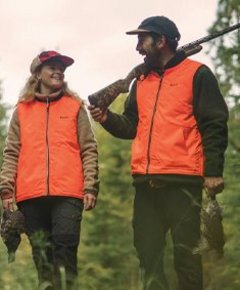Code of ethics
Code of ethics
A. Obligations to society
1.Member collaborates with public authorities to ensure compliance with the laws and regulations that concern the activities offered by his/her enterprise.
2. Member runs his/her establishment in a way that is serious-minded and in accordance with professional standards and, while performing his/her duty; the member must fully pledge his/her personal responsibility.
3. Member collaborates with the concerned authorities (Ministry responsible for the management of wildlife, Quebec Outfitters Federation, etc.) for the application of proper wildlife resources conservation and development practices.
4. Member also collaborates with wildlife territory managers and other stakeholders to ensure the integrated management of wildlife and forest resources.
B. Obligations to clients
5. Member will accurately describe the services offered and their prices in his/her advertisement.
6. At the time of the reservation, the services offered and their prices will always be fully described to the client, as well as the method of payment and the cancellation policy.
7. The services provided and the prices billed to the client must be consistent with the ones agreed upon at the time of the reservation. If circumstances beyond the control of the member require a change, he/she will offer services that are at least of similar quality or, if not possible, will offer a monetary compensation to the client.
8. Member will provide his/her client with accommodations and facilities that are safe and in good condition.
9. Member will endeavour to have employees that are trained, courteous and sufficient in number.
10. Member will give his/her clients the necessary information to ensure them a safe and pleasant stay. He/she will have all the equipment needed to practice the activities offered and hold all the necessary licences.
11. Member must not guarantee that fish or game will be harvested nor allude to any such guarantee.
12. Neither the member nor his/her guides will kill game nor catch fish for the clients.
13. Member will take the necessary measures to keep the catches in good condition and will hand them over to the clients at the time of their departure.
14. Member will make sure that his/her clients and staff are aware of the regulation in force regarding hunting, fishing and other activities, and will make sure that this regulation is respected.
C. Obligations to the Federation and its representative
15. Member must uphold the reputation of the Federation and ensure its credibility by his/her own professional behaviour as well as that of his/her employees.
16. Member will protect the Federation personally and collectively against all false representations.
17. Member will assist the development of the Federation through the exchange of his/her knowledge and experience with other members, and through his/her participation in the activities of the Federation.
18. Member must refuse his/her support to any member that does not comply with the demands of the professional ethics.
19. Member will respect this Code and comply with all decisions of the Ethics committee.
D. Obligations to colleagues
20. Member will be loyal to his/her colleagues and will not adversely affect, directly or indirectly, the existing relations between a colleague and his/her clients or employees.
21. Member must not maliciously attack, either directly or indirectly, the professional reputation of another member. However, if a member believes that a colleague is guilty of acts that are unethical, he/she should submit the case in writing to the Ethics committee who will receive it as a complaint.
E. Ethics committee
22. Committee ensures the application and respect of this Code by the members of the Federation; it recommends means of action to raise the awareness of outfitters about the importance of quality in services offered in outfitting establishments.
23. Committee receives any written complaint about any member of the Federation, provided that the complaint is related to this Code. The complaint can also be transmitted electronically as long as it includes the full mailing address of the plaintiff.
24. The secretary of the Committee can refuse to study a complaint if he judges that it is not enough documented. In such a case, he will inform the plaintiff and will invite him to add more facts to his/her complaint.
25. Committee will also receive a complaint against a non-member if he/she also owns another outfitting establishment that is a member. In the same way, a complaint will be receivable against a suspended or excluded member or one that would not have yet renewed his/her adhesion between the sale of a package and the moment of the trip.
26. Committee will send any complaint to the concerned member and will allow a minimum of 30 days to obtain his/her version of the facts.
27. After studying the versions of both the complainant and the outfitter, or the sole version of the complainant if the outfitter does not provide an answer, the Committee will make recommendations and communicate them to the concerned parties.
28. Committee will report its activities and refer to the Council for a final decision on any motion of suspension or exclusion of a member.
Members
The Ethics Committee of the Quebec Outfitters Federation is composed of 4 members:
- Secretary of the committee (Mr. Gaétan Hamel)
- Outfitter representative (Mr. Robbie Esterson)
- Consumer representative (Mr. André Boucher)
- Tourism sector representative (Mr. Théodore Carier)
Mandate
The Committee is mandated to look after the enforcement of the Code of ethics and its respect by all members of the Federation. The Code is voted by the members and includes obligations towards the society (respect of laws and regulations related to the industry), towards the customers (quality of lodging and services) and towards the Federation (participation in the development of its network). The aim is to reinforce the public image of the Quebec’s industry of outfitting.
There are 2 ways to submit a complaint against an outfitter member of the QOF:
a) By mail: The complaint has to be signed and mailed to :
Ethic Committee
Quebec Outfitters Federation
3137, Laberge Street
Québec (Québec) G1X 4B5
b) By email: use the form intended for this purpose Ethics Complaint Form.
To be considered, a complaint has to include the full mailing address of the plaintiff and be received within 90 days following the end of the stay.
Upon receipt of the complaint, the Secretary of the Committee answers back with an acknowledgement receipt to the plaintiff and sends a copy of the complaint to the outfitter in order to obtain his version of the facts and to be informed of the actions taken. Further on, the Committee studies the case at the next meeting. Those reunions are held twice a year: one in spring and the other one in fall. If required, recommendations will be produced. Those recommendations will be forwarded to both the outfitter and the customer.
In order to get to the best possible decision by the members of the Committee, it is important to submit a complaint as detailed as possible and to join pertinent pictures, emails, contracts, etc. In fact, the case study is exclusively made with the documents transmitted by both the plaintiff and the outfitter. None of those two will be present at the time of the case study.
Attributions
According to its actual status, and considering that membership is optional, the Ethics Committee does not have an interventionist power towards the members, as would have, for instance, a professional Corporation. Its role is instead to act as a mediator between a customer and a QOF member to reach, whenever possible, an agreement acceptable by both parties.




